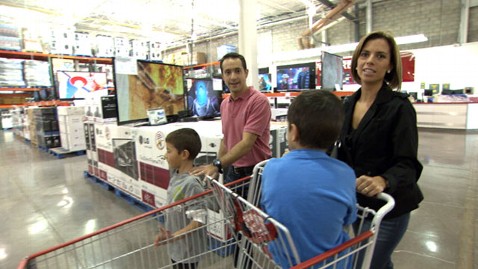U.S. Businesses Find Loyal Customers Among Mexico's Middle Class

Image credit: Eric Noll/ABC News
The hottest label for Mexico's new middle class seems to be "Made in America."
Nearly 1,120 miles away from Dallas - where the Usry family not only welcomed ABC News into its home but also let it remove everything not made in the U.S. - lives the Campos clan of Mexico City.
The Camposes - Antonio, Sandra and their children, Carlos and Tony - say they seek out American products.
"The first thing I think when I see ['Made in America'], I think big," Sandra Campos said. "Quality and big."
Like the Usrys, the Campos shop at Costco in Mexico City. When the two families compared their shopping lists on Skype, they found a lot of similarities - from peanut butter to protein bars.
Mexico City's Costco is stocked with Cape Cod potato chips from Massachusetts, granola bars from New Mexico and Pop-Tarts from Michigan. Even the butcher's aisles hold U.S. Department of Agriculture meat.
Antonio Campos said he really liked the Kirkland turkey breast.
"It's almost fat free," he said. "It's MIA."
The Camposes and others in Mexico's new middle class say they want big and are willing to pay a little extra for that American label and quality.
"These grapes are made in America," Antonio Campos said. "[It] is superior quality compared to other kinds of grapes."
A generation ago, 12 percent of the Mexican population was considered middle class. Now more than half - 70 million - fall under that classification.
Mexico's middle class has pushed trade with the U.S. up 17 percent, according to the U.S. Census Bureau. Last year, families like the Camposes bought $198 billion of U.S. products - double what it was five years ago.
The U.S. now sells more products to Mexico than to Brazil, India and Japan combined, according to the U.S. Census Bureau. And 6 million U.S. jobs are tied to feeding that market.
In Mexico City, family after family bought giant boxes of Kirkland Signature baby wipes - Costco's top-selling product and made in Orangeburg, N.Y. - even though the Mexican competitor's wipes are less expensive.
At the Nice-Pak Products factory in Orangeburg - where 2,500 jobs have been added since the recession - Robert Julius, the company's chairman, showed ABC News the difference between Kirkland's wipes and the Mexican product.
"Here's a product, a typical product that's on the shelf in Mexico," Julius said. "It's very weak. It hardly stays together. It's very thin. This is the Costco product that's ultra soft, incredibly strong. It's a larger wipe. Not only that, look at the difference in the size of the wipe."
"There is a general feeling in almost all international markets [that] 'made in the USA' means great quality and it's better," Julius said.